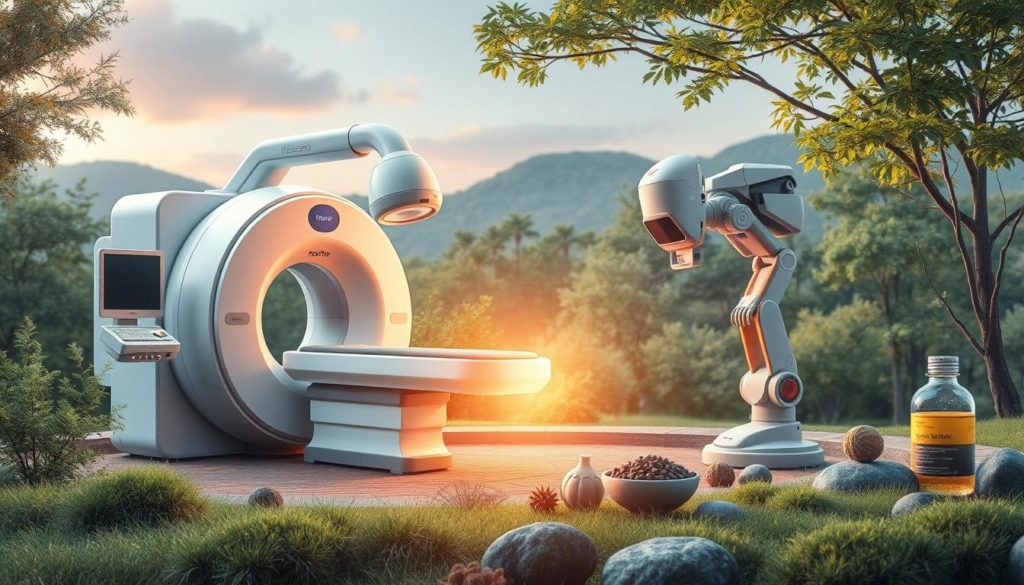Did you know about 1 in 8 men will get prostate cancer during their lives? It’s a top cancer type among American men. Traditional treatments work well if found early but can have big side effects. That’s why many look into alternative treatments to go with regular therapies.
Adding complementary treatments can help deal with side effects and might make life better. These can be diet changes, herbal remedies, or mind exercises. But, it’s key to talk with doctors to make sure they fit with other treatments.
If you’re thinking about other treatment paths, knowing what’s out there is important. We’re going to explore more on this topic. Stay with us to learn how alternative treatments for prostate cancer might help you.
Understanding Prostate Cancer and Its Traditional Treatments
Prostate cancer affects many American men. It comes in various stages but can be managed. Treatments like chemotherapy, radiation, and surgery are common.
Choosing a treatment depends on the cancer’s stage, the patient’s age, health, and preferences. Knowing about each option helps make the right choice. Talking to doctors is key to picking the best treatment.
Each therapy has side effects, such as incontinence and erectile dysfunction. These can change a patient’s life. So, treatments should match the patient’s specific needs.

| Treatment Option | Description | Common Side Effects |
|---|---|---|
| Chemotherapy | Use of drugs to destroy cancer cells | Hair loss, nausea, fatigue |
| Radiation Therapy | Use of high-energy rays to target cancer cells | Incontinence, urinary issues, skin irritation |
| Prostatectomy | Surgical removal of the prostate gland | Erectile dysfunction, incontinence, risk of infection |
Knowing about prostate cancer treatments and their side effects is crucial. This helps in managing the disease well.
Why Consider Alternative Prostate Cancer Treatments?
Many people turn to alternative medicine for prostate cancer to ease the tough effects of usual treatments. They aim to improve their life quality. These other prostate cancer treatments offer a wide range of options, like dietary help and stress relief techniques.
Researchers are studying these holistic methods to ensure they are safe and work. But patients must tell their doctors about them. Some might not have strong proof behind them. They could also affect regular cancer treatments. It’s vital to talk openly to make sure all treatments work together well, without causing harm.
Looking into these alternative therapies means checking out ways to help the body, mind, and nutritional health. This provides a well-rounded approach to help overall health. But it’s very important to get advice from healthcare experts to be safe.

Dietary Approaches to Prostate Cancer
Looking into nutrition helps find natural remedies for prostate cancer. Foods like lycopene, pomegranate juice, and green tea are beneficial. They have shown promise in supporting prostate health.
The Role of Lycopene in Prostate Health
Lycopene is a strong antioxidant found mainly in tomatoes. It’s linked to better prostate health. Eating foods high in lycopene, especially cooked tomatoes, might reduce prostate cancer risk.
This substance helps protect cells from damage. It plays a significant part in natural remedies for prostate cancer.
Benefits of Pomegranate Juice
Pomegranate juice is known for its potential in slowing prostate cancer cell growth. Rodent studies have shown its effectiveness. This calls for more human studies.
Though research is ongoing, adding pomegranate juice to your diet could help prostate health.
Green Tea and Prostate Cancer Risk
Green tea is famous for its health perks, including lots of polyphenols. Some studies suggest it might help reduce prostate cancer risk. Yet, the evidence is still being gathered.
Drinking green tea regularly could help keep the prostate healthy.
Herbal Remedies for Prostate Cancer
Herbal treatments for prostate cancer have become popular because they might have fewer side effects. Saw palmetto and pygeum are two herbs often used for prostate health.
Saw Palmetto: Traditional Uses and Modern Findings
Saw palmetto was first used by Native Americans for urinary problems. Now, it’s in modern herbal therapy for similar reasons. It may lessen inflammation and help balance hormones, important for the prostate.
Many look to saw palmetto supplements as a natural way to address prostate issues.
Exploring the Benefits of Pygeum
Pygeum comes from the African plum tree and fights inflammation. It’s thought to reduce prostate testosterone levels, which might help manage prostate cancer. However, more studies are needed to prove its effectiveness.
It’s vital to talk with doctors before trying any herbal remedies for prostate cancer. This ensures they’re safe and won’t conflict with other medicines.
Mind-Body Practices for Managing Prostate Cancer
Integrating mind-body practices into prostate cancer management can be really beneficial. Techniques like yoga and meditation help both the body and mind. They are good for reducing tiredness from cancer treatments, offering a complete recovery plan.
Yoga for prostate cancer can make a big difference in health. It involves stretching, breathing, and being mindful. Yoga helps lessen stress, improves how flexible you are, and might even better urinary and sexual health. For those getting treatment for prostate cancer, yoga is a great extra therapy.
The meditation benefits for prostate cancer patients are many. Regular meditation lowers anxiety, depression, and stress seen often in cancer treatment. Starting a meditation habit creates calm and peace. This is great for handling mental health better during these tough times.
While they don’t cure, mind-body practices do make life better for men with prostate cancer. They add to the usual treatments. This creates a broader approach to staying healthy and feeling well.
| Mind-Body Practice | Benefits |
|---|---|
| Yoga | Improves flexibility, reduces stress, enhances urinary and sexual health |
| Meditation | Reduces anxiety and depression, improves mental health, fosters calmness |
The Role of Supplements in Prostate Cancer Treatment
Research into supplements for prostate cancer has picked up. No cure exists yet, but some supplements are showing potential. Modified citrus pectin, for instance, could limit cancer spread in animals.
These promising results need more testing in humans. Patients should talk to their doctors before using supplements. Mixing supplements with standard treatments could cause issues. Professionals should guide the use of these dietary supplements.
| Supplement | Potential Benefits | Considerations |
|---|---|---|
| Modified Citrus Pectin | May inhibit cancer cell spread; shown promise in animal studies. | Requires further human-focused research; discuss with a healthcare provider. |
| Vitamin D | Supports overall immune function and has anti-inflammatory effects. | Overuse can lead to toxicity; monitor levels with medical supervision. |
Using supplements as complementary prostate cancer treatment may help. When added wisely, they can support overall treatment. Always talk to healthcare providers to keep things safe and effective.
Holistic Approaches for Prostate Cancer
Holistic methods focus on improving the whole person’s health, not just the disease. These methods include meditation, relaxation, and acupuncture. They help create a balanced support system for cancer treatment.
Meditation and Relaxation Techniques
The mental impact of prostate cancer can be overwhelming. Adding meditation and relaxation techniques for cancer to daily life can ease anxiety and depression. They help patients stay calm and emotionally strong, which is key in fighting cancer.
Meditation can lower stress, improve sleep, and strengthen the immune system. It works well alongside traditional treatment methods.
Acupuncture and Its Potential Benefits
Acupuncture, an ancient practice, has been shown to reduce pain and nausea from cancer treatments. It uses thin needles to stimulate the body’s points, offering a non-drug way to ease side effects. Studies show acupuncture can make patients feel better during cancer care. For more details, check out this article on alternative treatments for prostate.
Integrative Prostate Cancer Treatments
Integrative prostate cancer treatments mix regular medical methods with alternative therapies. This creates a more whole approach to care. These plans consider the body, mind, and social aspects of prostate cancer. They aim to make patients’ lives better.
Adding alternative therapies to the treatment plan can include many strategies. These include changing the diet, using herbal supplements, and practicing mind-body techniques. A team of different specialists watches over each part to make sure they are safe and work well.
By using both regular and complementary methods, this approach offers a full model of care. It could make life better for those dealing with prostate cancer. This way of treating prostate cancer looks at the entire person, not just the illness.
- Dietary Adjustments: Strategies such as incorporating more lycopene and pomegranate juice into the diet.
- Herbal Supplements: Use of remedies like saw palmetto and pygeum for their potential benefits.
- Mind-Body Practices: Incorporating techniques like meditation and acupuncture to manage stress and pain.
The main goal of using alternative therapies with regular treatments is to improve care. It ensures patients get the most thorough and effective treatment possible.
Risks and Considerations of Alternative Treatments
Exploring alternative treatments for prostate cancer seems hopeful. Yet, it’s very important to know the risks involved. Since there’s little oversight and not enough proof, these treatments can sometimes be unsafe. Problems might not show up until after negative effects occur.
Choosing alternative treatments over proven ones can also be risky. Treatments like surgery, radiation, and chemotherapy are known to work well. They meet high safety standards. If you ignore these for untested methods, your health might suffer.
When thinking about alternative treatments, talk everything over with your doctor. This ensures you make a well-informed choice. It’s key to be sure that these alternatives won’t interfere with regular cancer treatments. Assessing the risks involved is critical for your overall health and fighting prostate cancer effectively.
FAQ
What are alternative prostate cancer treatments?
Options like dietary supplements, mind-body techniques, and herbal remedies are types of alternative treatments. They aim to work alongside traditional therapies. Their goal is to lessen side effects and boost life quality.
Can dietary changes help manage prostate cancer?
Certain foods may help fight prostate cancer. For instance, cooked tomatoes, pomegranate juice, and green tea are considered beneficial. It’s important to talk with doctors about including these in your diet.
What are the side effects of traditional prostate cancer treatments?
Traditional treatments can lead to issues like incontinence and erectile dysfunction. Patients might also feel very tired or face mental health challenges. Knowing these effects helps in making better decisions.
Why consider alternative prostate cancer treatments?
Patients turn to alternative treatments to ease conventional therapy side effects. It’s essential to discuss these options with a healthcare professional. This ensures they are both safe and helpful.
What role does lycopene play in prostate health?
Lycopene in cooked tomatoes may reduce prostate cancer risk. While promising, it’s best used as part of a varied diet. Relying on it alone for treatment isn’t advised.
Are pomegranate juice and green tea effective for prostate cancer?
Studies in rodents suggest pomegranate juice could slow prostate cancer cell growth. Green tea’s benefits come from its polyphenols. However, human studies are lacking. So, always consult your doctor.
What are the benefits of herbal remedies like saw palmetto and pygeum?
Herbs like saw palmetto and pygeum may help with urinary problems and inflammation. But, their impact on prostate cancer needs more research. Using them requires medical advice to prevent treatment clashes.
How can mind-body practices help prostate cancer patients?
Yoga and meditation can reduce fatigue and help with mental health. They ease some side effects too. These practices improve overall health as part of complementary care.
Are dietary supplements beneficial for prostate cancer treatment?
Certain supplements, like modified citrus pectin, show potential. Yet, their effectiveness in humans remains unproven. Always talk to a healthcare provider before starting supplements. They might affect other therapies.
What holistic approaches are available for prostate cancer management?
Holistic methods like meditation, relaxation, and acupuncture target stress, anxiety, and pain. They support traditional treatments. Professional guidance is necessary when integrating them into care plans.
What are integrative prostate cancer treatments?
Integrative care blends conventional and alternative treatments. This approach aims to care for the patient’s overall health. A team of medical experts oversees these combined treatments for safety and success.
What are the risks of using alternative treatments for prostate cancer?
Alternative treatments could pose risks due to insufficient testing and regulation. They might also affect conventional treatments negatively or have harmful effects. Consulting healthcare providers is crucial before trying these options.


